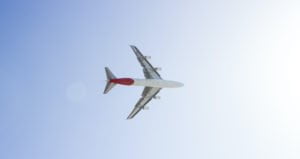 World-renowned IATA training, known for its high-quality standards, will soon become available for Lithuanian aviation specialists as the International Air Transport Association (IATA) recognises the experience of Kazimieras Simonavičius University (KSU) and its ability to ensure high quality studies, acknowledging KSU as an authorised IATA training centre and granting it the right to organise three accredited courses.
World-renowned IATA training, known for its high-quality standards, will soon become available for Lithuanian aviation specialists as the International Air Transport Association (IATA) recognises the experience of Kazimieras Simonavičius University (KSU) and its ability to ensure high quality studies, acknowledging KSU as an authorised IATA training centre and granting it the right to organise three accredited courses.
“We are glad to have joined the worldwide aviation and tourism industry organisation IATA, becoming the only authorised IATA training centre in the Baltic States. This is excellent proof that studies organised at KSU and both the experience and resources we hold in performing aviation training is viewed as matching IATA’s global standards and values,” KSU Business School director Deimantė Žilinskienė stated.
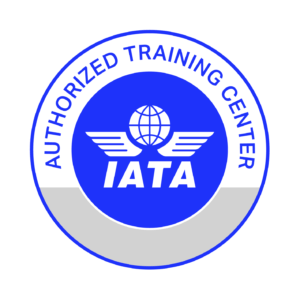 According to D. Žilinskienė, KSU is the only university in Lithuania to organise aviation management bachelor’s studies training highly qualified aviation management specialists, and IATA courses will be integrated into the aviation management studies from 2020. Alongside its IATA accredited instructors, KSU will run three authorised courses: Aviation Security Awareness, Cargo Introductory Course and Airline Revenue Management. Individuals who successfully complete the selected modules will be awarded a special IATA certificate, which is recognised around the world.
According to D. Žilinskienė, KSU is the only university in Lithuania to organise aviation management bachelor’s studies training highly qualified aviation management specialists, and IATA courses will be integrated into the aviation management studies from 2020. Alongside its IATA accredited instructors, KSU will run three authorised courses: Aviation Security Awareness, Cargo Introductory Course and Airline Revenue Management. Individuals who successfully complete the selected modules will be awarded a special IATA certificate, which is recognised around the world.
The IATA training will be available not only to KSU Aviation Management Studies Programme students but also to all those working in the aviation and tourism industries, who seek to improve and obtain this prestigious training certificate.
About KSU
Kazimieras Simonavičius University (KSU) was founded in 2003 as a private higher education institution with departments in Vilnius and Klaipėda. The studies offered encompass the main areas of social science – business and management, public administration, law, communications, political science and various training courses. KSU also organises academic research on the topic of big data.
About IATA
The International Air Transport Association (IATA) unites 290 airlines, which encompass 93 per cent scheduled international air traffic. Currently, IATA operates in 150 countries around the world.
 Please be informed that contact activities at Kazimieras Simonavičius University are suspended from 2020 November 3th for the prevention of Coronavirus (COVID-19).
Please be informed that contact activities at Kazimieras Simonavičius University are suspended from 2020 November 3th for the prevention of Coronavirus (COVID-19).
The educational process will continue in a virtual (online) way. Students and lecturers will be informed about the online studies by e-mail.
KSU students (including international students) and staff returned from COVID-19 affected countries, have to spend 14 days on quarantine. International students have to inform International Coordinator about their return and quarantine.
Self-isolation is mandatory upon your arrival from red painted countries: https://bit.ly/3o22rSR
For more information, news and recommendation, please visit World Health Organization website: https://bit.ly/398tvIq
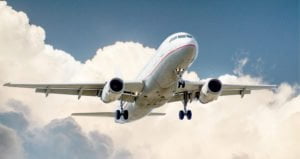 An innovative course titled „Development of Sustainable Aviation” was developed in a partnership of three organizations (from Poland, Lithuania and Latvia). The course includes topics related to a new conceptual model of responsible and conscious aviation that sees its development in line with the interests of the social and natural environment and takes into account existing ecological barriers and expectations of the society.
An innovative course titled „Development of Sustainable Aviation” was developed in a partnership of three organizations (from Poland, Lithuania and Latvia). The course includes topics related to a new conceptual model of responsible and conscious aviation that sees its development in line with the interests of the social and natural environment and takes into account existing ecological barriers and expectations of the society.
The main objective of the project „Spread your wings” was to increase the quality and relevance of knowledge and skills of bachelor and master degree Aviation Management and related disciplines students’ in response to the needs of the labour market and the socio-economic environment.
During the project the following results were achieved:
 More information on the project’s results is available here.
More information on the project’s results is available here.
The project was financed by Erasmus+ programme. Project No. 2017-1-PL01-KA203-038782.
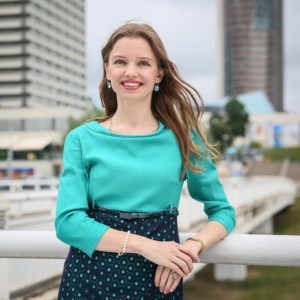 The tourism and hospitality industry is counting month six of the greatest crisis in the history of professional tourism. The World Tourism Organisation has been amending data, stating that unemployment in the tourism sector at the global level will no longer reach the previously predicted 100 million, but 120 million lost jobs, and that now is the time to think about how tourism can prepare for the recovery stage. At the same time, the International Air Traffic Association (IATA) has reported that the transition from 2023 to 2024 could mark a miracle when international aviation returns to around the same flight regime that was seen up until 2019.
The tourism and hospitality industry is counting month six of the greatest crisis in the history of professional tourism. The World Tourism Organisation has been amending data, stating that unemployment in the tourism sector at the global level will no longer reach the previously predicted 100 million, but 120 million lost jobs, and that now is the time to think about how tourism can prepare for the recovery stage. At the same time, the International Air Traffic Association (IATA) has reported that the transition from 2023 to 2024 could mark a miracle when international aviation returns to around the same flight regime that was seen up until 2019.
We spoke about the challenges tourism is faced with and prospects for the coming few years with long time tourism businesswoman, Kazimieras Simonavičius, and University senior researcher docent Dr Rasa Levickaitė.
We know that tourism is one of the industries most harmed by the COVID-19 pandemic. Could you briefly overview the core issues?
I believe that the freeze in the tourism industry that was caused by the pandemic is fundamentally related to three critical factors – the collapse of modes of operation, world-level uncertainty, and loss of communications. However, we must not forget that crises are also historic opportunities, which I believe will divert tourism in specifically the direction of innovation.
Could you present a broader overview of these factors?
Firstly, tourism subjects have for the first time in history been met with the collapse of operational models of an unpredictable scale. The existing business models, the consolidated service activities, supply chains, partnership networks developed over decades, improved physical customer service forms and electronic sales platforms were created for mono-directional tourism service provision movement. Due to the pandemic, this movement was reversed, and so the business models that proved effective prior to the pandemic proceeded to fall apart. In essence, tourism has historically been a business of advance payments and so, a global debt chain emerged immediately, with its structure being a difficult task to overcome for both affected customers, and governments seeking solutions.
Second, the tourism subjects cannot secure incomes in the face of the lockdown and emergency situation, and are struggling with global uncertainty. Countries maintained differing lockdown restrictions, apply varying infection rate indicators, and policies of movement between countries and self-isolation. The rules change too frequently for it to be possible to plan even a month ahead. Organisations have been encouraging their staff to work remotely and only travel in exceptional cases, and local tourism has been shattering records, but not all countries’ infrastructures and consumer expectations match. Due to this, the World Tourism Organisation announced that in 2020, international tourism will have fallen by 78 per cent by the end of the year.
Third, the tourism industry, both at the micro and macro levels, will always be based on the importance of communicating. The practice of communicating simply vanished within a few weeks into the pandemic. The internal communications of organisations cooled off or ceased, which can be blamed on the stress of company leadership, and the diverting of priorities to urgent activities. Communication between partners weakened to the point where some businesses even didn’t indicate to other businesses or long term partners that they would be halting operations for half a year. And when finally, at the level of some states, tourism became a demonised industry overnight, one that supposedly not only boosted the spread of the pandemic, but also appropriated the consumers’ money.
So what do you predict for the tourism industry?
Academics and businessmen concur that tourism will no longer be as it was. However, radically diverging forecasts are being employed to model the future – some say that travel will be rare, slow, deep and, without a doubt, more expensive. Others believe that a pause of a few years when we will have travelled all across our own countries will grant travellers an unquenchable desire to see as much as possible and so the intensity of tourism and the demand for experiences and entertainment will jump well above the pre-pandemic period.
Scientists are studying the pandemic’s impact on tourism, but at a practical level, would you advise to choose tourism studies if the situation is so difficult right now?
The Lithuanian research and study programme creator community has spoken up about future scenarios and how to adequately prepare for them. For example, this year, the Kazimieras Simonavičius University Institute of Creative Society and Economics‘ Leisure and Tourism Industry bachelor‘s study programme is running in parallel with new views dictated by the pandemic. Alongside academic communications theory and business management disciplines, a cycle of lectures is being included with Lithuanian, Chinese, Italian, American and Finnish leisure and tourism industry researchers. Furthermore, businesspeople; airline, hotel, travel organiser and hospitality sector representatives will share news, novelties and concrete knowledge, which will lay down a foundation of practical understanding, as well as prospects for the students and academic community to model the near future of tourism. In response to the freeze in tourism and the uncertainty felt by those applying, application to this programme has been extended to September 30, with an exceptional opportunity offered by lecturers to catch up on the lectures missed in September.
What do you imagine the future of tourism will be like?
It is difficult to present a single accurate answer right now on what will be, and what would be best. It is premature to discuss, but systematic preparations are needed, new scenarios must be envisioned. The renaissance of tourism is inevitably nearing and in a few years, we will need new modes of operation once again, new competencies, new forms of communication. And so we should begin to oil our skis in the summer and appropriately prepare for the near and very interesting future of the tourism industry.

From now on, the quality of studies at Kazimieras Simonavičius University will be supervised by the newly established Quality Management and Analysis Department, headed by Agnė Bružaitė as the director of the department.
The new Department will supervise the study quality, including gains in both cognitive and non-cognitive aspects of learning, carry out analysis and improvements of study programs, their committees, research processes, monitor graduate’s careers, and employment, introduce new technological knowledge into the study process, etc. The Quality Management and Analysis Division will also be responsible for coordinating curriculum development, self-assessment, and accreditation.
“Quality assurance and continuous improvement of studies and research are one of the main priorities of KSU. Taking into account the consistent growth and development of the university academic activities, the newly established Quality Management and Analysis Department will help to monitor, analyze and ensure the quality supervision of studies and other activities and promote its improvement: implement the new, modern study and research methods, technological knowledge, innovations, the latest technology. I believe that this department will help to maintain and further develop the progressive cooperation between the University’s academic departments, the academic community, and social stakeholders”, said Agnė Bružaitė, Director of Quality Management and Analysis Department.
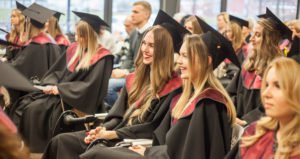 We kindly invite you to participate in the Bachelor’s and Master’s degree awarding ceremony of Kazimieras Simonavičius University (KSU), which will take place on 3rd of July at 1 p.m. at the University (Dariaus ir Girėno st. 21, Vilnius).
We kindly invite you to participate in the Bachelor’s and Master’s degree awarding ceremony of Kazimieras Simonavičius University (KSU), which will take place on 3rd of July at 1 p.m. at the University (Dariaus ir Girėno st. 21, Vilnius).
During the ceremony, degrees will be awarded to graduates of the bachelor’s programs in Creative and Cultural Industries, Fashion Industries, Aviation Management, Political Communication and Journalism.
Master’s degrees will be awarded to graduates of the Law and Organizational Innovation and Management programs.
We recommend KSU graduates to arrive an hour in advance so that you can dress up in an academic gown, sign the diploma register, and sit comfortably in the 1st-floor hall.
More information about the Gown: studijos@ksu.lt
Attention: guests will be able to park their cars on Dariaus ir Girėno str. 25 in the parking lot.
 Kazimieras Simonavičius University (KSU) in cooperation with the Civil Aviation Association (CAVIA) and the International Air Transport Association (IATA), is organizing an open webinar and panel discussion “Restart of Aviation Industry: How We Do it in Lithuania?”.
Kazimieras Simonavičius University (KSU) in cooperation with the Civil Aviation Association (CAVIA) and the International Air Transport Association (IATA), is organizing an open webinar and panel discussion “Restart of Aviation Industry: How We Do it in Lithuania?”.
Moderator – Artūras Stankevičius, President of the Civil Aviation Association (CAVIA).
The webinar will be held online on June 4th at 10 a.m., on the Zoom platform.
During the webinar-panel discussion, the speakers will share good practices and their insights on:
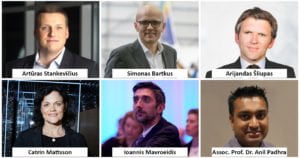
Webinar Speakers
Programme:
10:00-10:05
Opening Word
Artūras Stankevičius, President of CAVIA Lithuania.
10:05-10:20
A Roadmap to Safely Restarting Aviation
Ioannis Mavroeidis, Aviation Industry Analyst, Nordic and Baltic at International Air Transport Association (IATA)
10:20-10:35
A Roadmap to Safely Restarting Aviation
Catrin Mattsson, Area Manager, Nordic and Baltic at International Air Transport Association (IATA)
10:35-10:50
A Green Recovery for the Aviation Industry.
Assoc. Prof. Dr. Anil Padhra, Visiting professor of the International Aviation and Aviation Finance modules of the KSU Aviation Management Bachelor’s study programme.
10:50-11:05
We Took Off for the Recovery But It Will Not Be Steep: COVID-19 Impact for Fleets and Capacities
Simonas Bartkus, CMO (Chief Marketing Officer), “ch-aviation”.
11:05-11:20
Importance of Dialog with the Key Stakeholders for Successful Re-start
Arijandas Šliupas, Chairman of the Board of Lithuanian Airports.
11: 20-11: 50
Panel Discussion
Moderator – Artūras Stankevičius, President of CAVIA Lithuania
Registration is open up here until June 3rd at 9 p.m.
Participation is free of charge, but registration is required.
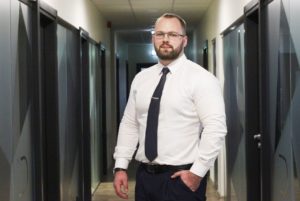
Vladislav Kežun
Vladislav Kežun is a distance-learning bachelor’s student in Aviation Management study program and living in sunny Bangkok, where he is working in the sales department for FL Technics: MRO Aircraft Maintenance and Repair Services company for the past few years. Vladislav talks about his career in aviation and the peculiarities of this sector.
How did you decide to start your career in the aviation sector? What makes this job interesting and how did you find yourself in Bangkok?
Before working in the aviation sector, I worked in sales for a while with industrialists. However, very quickly I realized that the industrial sector in Lithuania is not very large and there are few prospects. I looked at different sectors and by chance saw an advertisement that an airline was looking for employees. My job interview took place at the Lithuanian airport, and I still remember some conversation word for word “If you have already got into aviation, it is unlikely that you will get out of it.” The words seemed fateful for me.
I have been working for the FL Technics for 4 years. Our market is very large: the Middle East, Africa, Europe, and Asia, so I have been living and working in one of the company’s divisions based in Bangkok.
What does your workday look like?
If the day starts in the office in the morning, I first spend a few hours reading and replying to emails, finishing up my meetings, and getting ready for new ones.
There is no monotony in my work, I have to spend a lot of time flying for meetings with clients. My responsibility is to develop the Asian market, and of course, to make as many successful sales transactions as possible.
Do you sell aircraft parts? what amounts we are talking about and who are your buyers? In what circumstances may a buyer need, for example, an aircraft engine?
The sums are really impressive – we are talking about millions of transactions. The main customers are airlines from different countries. Aircraft engines are one of the most expensive parts of an aircraft. In terms of demand, it occurs when an old engine wears out. Airplanes are designed to last for a long time (e.g., American airplanes have a lifespan of about 30 years), but engine life is fairly perpetual, much like a car’s engine condition is determined by mileage. Therefore, the engines need to be replaced or repaired after some time.
The work is fun, doing well, so what inspired you and why did you decide to start studying Aviation Management?
I studied business management at another high school, but the studies did not live up to my expectations. I studied many different disciplines, but nothing specific. When working with classic sales, such knowledge may be sufficient, but in my case, the chosen field of aviation is very specific and such general knowledge is not enough.
The FL Technics pays a lot of attention to their staff development: I had more than 10 different types of trainings during my first year at work. Those trainings made me realize, how big the industry is and how much space is available for the growth and expansion. This probably had the biggest impact on my decision to study Aviation Management and earn a bachelor’s degree in this niche field.
How do you rate such a choice today? How do you manage to combine work with studies?
Reconciling work with studies is great, Thailand is 4 hours ahead of Lithuania, after work I can listen to all the lectures. In my studies, I highly appreciate the skills and dedication of the teachers. They are not only strong in theoretical knowledge but also practitioners, who are experts in aviation and understand the size, importance, and scale of the market. This form of study is very convenient for a working person, for example, if I have an important meeting with a client in China and I can’t miss it, so I can deliver my homework a few days later, or if I can’t attend lectures remotely “live”, I have the possibility to view the uploaded lecture later. Such understanding, convenience, and individual attention are immensely valuable.
Who would you recommend distance Aviation Management studies?
This is a very specific area, so I recommend distance learning Aviation Management studies for those who already working in the sector and have the basic knowledge to understand the subjects or the terminology. It is also better for students if they are from the same industry. Hence, they can speak the same aviation language, grow their network and share their diverse work experiences of domestic or international airlines.
Read more about Aviation Management Online Study Programme.
![]()

Kazimieras Simonavičius University, in cooperation with Vilnius Legal Hackers, is organising an open lecture on Legal Tech Trends in 2020. The lecture will be held on 18th of May at 10 AM by Dr. Martynas Mockus. Duration – 45min.
Topic: Legal Tech Trends in 2020
You will learn:
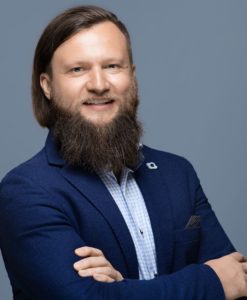
Dr. Martynas Mockus
Martynas Mockus holds Joint International Doctoral (Ph.D.) Degree in Law, Science, and Technology (http://www.last-jd.eu/) issued by 5 European universities. He was lecturing and lead students, lawyers and public servants in law and computer science domain since 2005. His research interests are legal ontologies, legislation 2.0, and legal issues of disruptive technologies and phenomenons. A few of Martynas’s accomplishments and roles have included:
Registration. Participation is free of charge but the registration is mandatory.
 We invite you to participate in an open lecture “The difficult challenge of Cross-Cultural Communication during quarantine period” which will be held on 14th of May at 2 PM. Lecture speaker – Dr. Javed Imran, lecturer at Kazimieras Simonavičius University Business School. Duration of the lecture – 45 min.
We invite you to participate in an open lecture “The difficult challenge of Cross-Cultural Communication during quarantine period” which will be held on 14th of May at 2 PM. Lecture speaker – Dr. Javed Imran, lecturer at Kazimieras Simonavičius University Business School. Duration of the lecture – 45 min.
Normal life as people knew it has come to a hold after quarantine, restrictions on free movement and nationwide lockdowns. The different ways each nation coping with the huge challenge of coronavirus pandemic and confronting economic and social risks is broadly revealing a lot about their nation’s distinct character and cultural environment. This sudden change and Slowbalization can badly affect us directly or indirectly at personal and or professional level. To deal with the current and post coronavirus challenge, rapid and effective cross-cultural communication is inevitable.
What you will learn in this lecture:
Who this lecture is for:
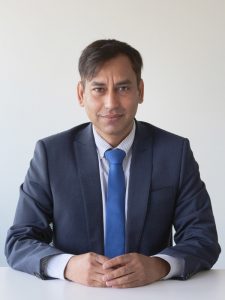
Dr. Javed Imran (KSU photo)
Dr. Javed Imran teaches Intercultural Communication at KSU Business School and coordinates KSU International programs. He has more than 10 years of experience in the areas of cross-cultural communication, international collaborations, cross-cultural negotiations and international development. He taught in several prestigious universities in Asia and Europe, highlighting mainly the links between diversity, dialogue and development, and fostering global mutual understanding.
He has also provided Internationalization Strategies Advisory Service to institutional leaders and teams interested in developing or reviewing their internationalization policy, strategy, in various programs.
Participation is free of charge but registration is mandatory. Please, register here.
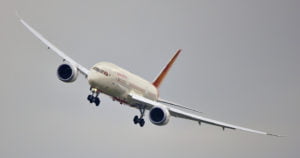 Since last September, Kazimieras Simonavičius University offers not only the full-time form of Aviation Management studies, but also full-time online studies. Online Studies allows lectures and consultations to be held remotely. Kazimieras Simonavičius University is the only university in Lithuania that provides Aviation Management studies onsite and online. Online learning is tailored to working people – students can study wherever they are and when they are able to.
Since last September, Kazimieras Simonavičius University offers not only the full-time form of Aviation Management studies, but also full-time online studies. Online Studies allows lectures and consultations to be held remotely. Kazimieras Simonavičius University is the only university in Lithuania that provides Aviation Management studies onsite and online. Online learning is tailored to working people – students can study wherever they are and when they are able to.
Working in aviation requires industry-specific knowledge, both if the employee works in an administrative field or in an aircraft crew. Some employees start their work without knowing the peculiarities of the sector, so they have to deepen their knowledge not only by working, but also by studying.
Those who want to know better what online learning is, we invite to participate in the open online lecture “Aviation and COVID-19: The Path to Recovery” which is going to be held by KSU Aviation Management lecturer Assoc. Prof. Dr. Anil Padhra on the 5th of May at 6 PM.
More information and registration: https://bit.ly/2yVTw0e
More information about Aviation Management online studies: https://bit.ly/2WdqyRn
 KSU partner – Algebra International university (Croatia) invites students to spend the summer in a meaningful and interesting way by participating in the distance Summer School, which will take place on July 5-25.
KSU partner – Algebra International university (Croatia) invites students to spend the summer in a meaningful and interesting way by participating in the distance Summer School, which will take place on July 5-25.
KSU students will receive a 5% discount on the total price.
Courses offered:
• Artificial intelligence;
• Cyber security;
• Branding;
• Data-driven storytelling.
All offered courses are 6 or 3 ECTS credits, so it is possible to transfer earned credit back to your home institution where you are presently enrolled in a degree program.
Registration is open until May 15, 2020.
All information and registration: https://bit.ly/2xVXlCn